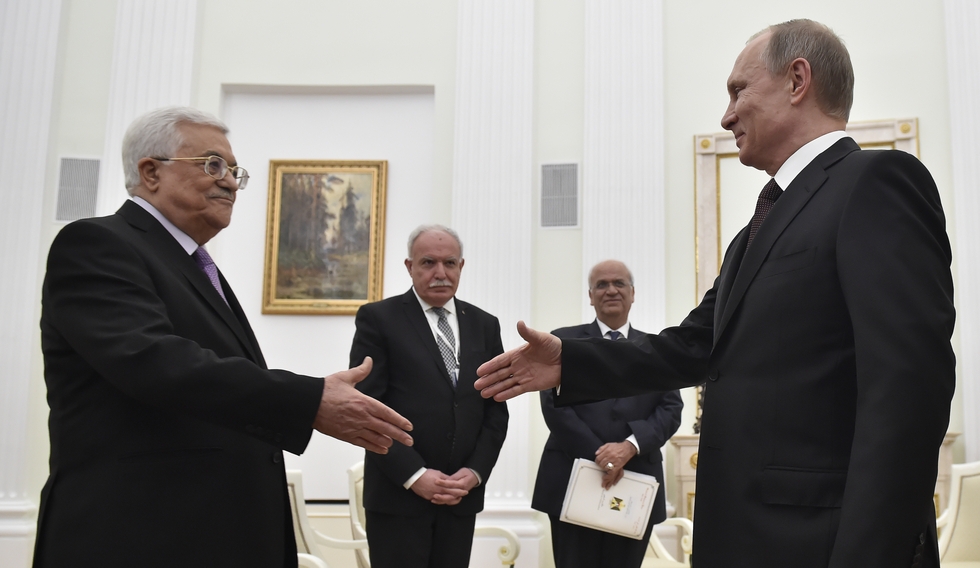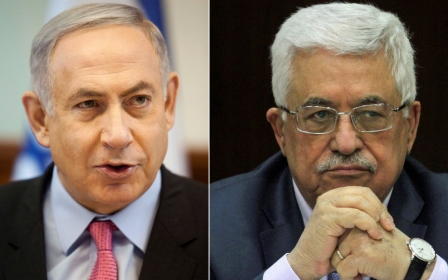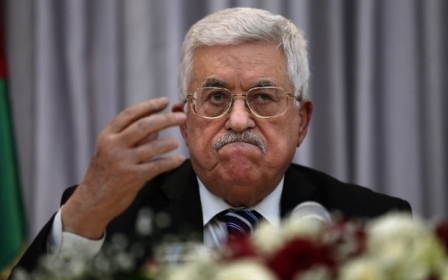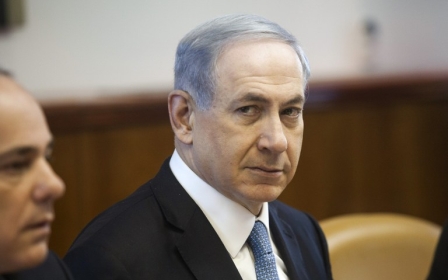Palestinians deny Israeli claims that Abbas was a Russian spy
Israeli television channel claims Palestinian President Mahmoud Abbas spied for the Kremlin in the 1980s with the codename 'mole'

Russian President Vladimir Putin, right, shakes hands with Palestinian leader Mahmoud Abbas (AFP)
Published date: 8 September 2016 13:25 BST
|
Last update: 8 years 2 months ago
Sources close to Palestinian president Mahmoud Abbas dismissed claims on Thursday that he was a Soviet spy in Damascus in the 1980s, as "an Israeli absurdity" and a "smear" intended to derail a Russian peace initiative.
The claims emerged in a report by Israeli public television on Wednesday night. It quoted two researchers who are studying the so-called Mitrokhin papers, which are stored in Britain at Cambridge University's Churchill Archives Centre.
"In 1983, he [Abbas] is listed as being groomed by the KGB under the codename Krotov ("the mole"), one of the Israeli researchers, Isabella Ginor, told the programme.
Abbas spokesman, Nabil Abu Rudeineh, told AFP it "falls under the framework of Israeli absurdities which we have got used to", and he called it a "smear campaign."
Abbas, 81, was born in what was then British mandate Palestine, but his family fled to Syria during the 1948 war surrounding the creation of Israel.
The report did not make clear what Abbas is alleged to have done for the Soviets.
"It is clear Israel is troubled by the (Palestinians') strategic relationship with Russia and by the clear and announced Russian position, which is to solve the Palestinian-Israeli conflict on the basis on an independent Palestinian state and the right of self-determination for our people," Abu Rudeineh said.
The story has broken just as Russian President Vladimir Putin seeks to organise a meeting between Abbas and Israeli Prime Minister Benjamin Netanyahu. Putin's Middle East envoy, Mikhail Bogdanov, met both Netanyahu and Palestinian officials this week.
The Mitrokhin Archive, the source for the story, is based on files from the KGB, the Soviet spy agency, that were smuggled to Britain by Major Vasili Mitrokhin, a senior archivist in the KGB's foreign intelligence section from 1972 until his retirement in 1984. He became disillusioned with domestic Soviet oppression and secretly copied information by hand, before defecting to Britain with it in 1992.
The television report recalled that the Russian envoy, Bogdanov, was stationed in Damascus in 1983. His official CV online shows that he was in Syria between 1983 and 1989.
Abbas claimed earlier this week that a meeting with Netanyahu had been set for Friday, but he said that an aide to the Israeli premier proposed delaying it and it was called off.
Netanyahu has repeated his position - he is ready to meet Abbas any time, anywhere, as long as it is without preconditions.
Palestinian leaders have previously called for the release of prisoners, a deadline for the end of the occupation of the West Bank, and a halt to Israeli settlement building as conditions for talks.
It is unclear whether Abbas has stuck to those demands.
This article is available in French on Middle East Eye French edition.
New MEE newsletter: Jerusalem Dispatch
Sign up to get the latest insights and analysis on Israel-Palestine, alongside Turkey Unpacked and other MEE newsletters
Middle East Eye delivers independent and unrivalled coverage and analysis of the Middle East, North Africa and beyond. To learn more about republishing this content and the associated fees, please fill out this form. More about MEE can be found here.




